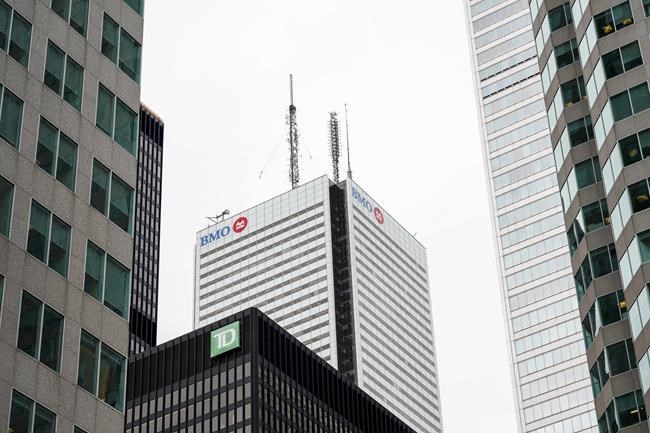TORONTO — A report by BloombergNEF finds that while Canada's top five banks are among the biggest energy financiers globally, they rank among the worst of the top 100 when measured on how much of that funding is directed to low-carbon sources.
The report found that in 2022 banks globally directed an estimated 73 cents toward low-carbon energy for every dollar supporting fossil fuel supply, or a 0.73-to-one ratio. That's well off the four-to-one ratio the report notes they need to hit this decade to limit global warming to 1.5 C.
Canada's biggest banks ranged in ratios of between 0.45:1 for BMO's $18.9 billion in energy funding, enough to place it 88th in the ranking, down to 0.32:1 for Scotiabank's $35.9 billion in funding, which pushed it below the top 100.
In between, CIBC had a 0.41:1 ratio for its $17.9 billion in funding, RBC had a 0.37:1 ratio for its $42.7 billion, and TD Bank had a 0.35:1 ratio for its $30.2 billion in funding, putting it at the bottom of the list of 100 banks.
National Bank was a notable outlier, coming in at $1.10 in low-carbon funding for every dollar put toward fossil fuels in its $14.9 billion in financing, enough to rank 52nd globally.
The report showed BMO, TD and Scotiabank's ratios worsened from 2021, while CIBC and National Bank improved.
RBC's ratio was the same as in the 2021 report, but a downward revision to last year's low-carbon ratio left the bank as improving this year.
RBC spokesman Andrew Block said the report highlights the importance of increasing low-carbon energy supply that's needed to meet global net-zero goals.
He said the bank expects to continue to improve its ratio ahead, as RBC has strengthened its ability to scale up financing of low-carbon energy.
"The shift in global energy systems is picking up, and we will provide further updates on our own progress in early 2024."
Richard Brooks, a climate finance director at environmental organization Stand.earth, said in a statement that he was disappointed to see the lack of progress by banks on driving climate solutions, as the world is already feeling the effects of extreme weather.
"No bank is doing its fair share of the work required to transition our global energy systems. In fact, they continue to make the problem worse,” he said.
Other banks did not immediately provide comment.
This report by The Canadian Press was first published Dec. 14, 2023.
Companies in this story: (TSX:TD; TSX:BMO; TSX:BNS; TSX:RY; TSX:NA, TSX:CM)
Ian Bickis, The Canadian Press

